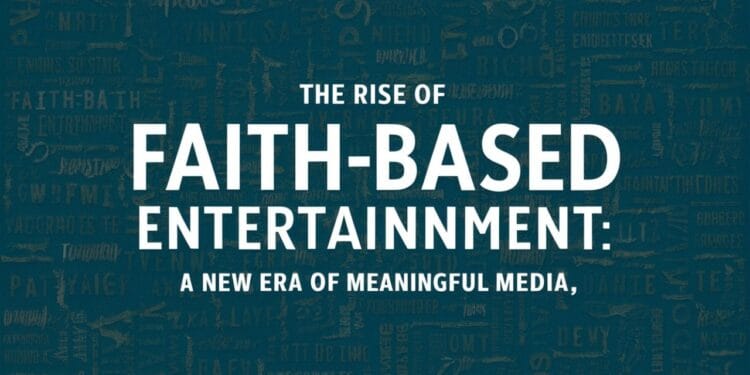No products in the cart.
The Rise of Faith-Based Entertainment: A New Era of Meaningful Media
This post contains paid and/or affiliate links. I make a small commission at no extra cost to you. Please see our Privacy Policy.
In today’s media world, a quiet change is happening. Faith-based entertainment is moving from the sidelines to the spotlight.
Movies like Jesus Revolution and TV shows like The Chosen show that people want more than just action and drama. They want stories with meaning.
Here are some interesting facts:
- The Chosen, a series about Jesus, has been watched over 600 million times worldwide.
- Jesus Revolution (2023) made **54 million at the box office, against a 15 million budget.
- Christian music stars like Lauren Daigle and Elevation Worship keep topping Billboard charts.
Why is faith-based entertainment so popular today? What does it mean for the future of media? We’ll dive into these questions and explore the growth of faith-driven stories.
What Is Faith-Based Entertainment?
Definition and Scope
Faith-based entertainment includes films, TV shows, music, books, podcasts, and social media with religious themes. It’s not just about Christianity but also other faiths.
Today’s faith-based media focuses on compelling storytelling with spiritual messages. It’s not preachy like old times.
A Brief History
- Early Christian Films (1940s-1970s): Low-budget movies like The Jesus Film (1979) were for missionary work.
- The Rise of Christian Cinema (2000s): The Passion of the Christ (2004) made $612 million worldwide, showing faith films can be big hits.
- Mainstream Acceptance (2010s-Present): Studios like Affirm Films (Sony) and Pure Flix started making quality faith films. Streaming made them more accessible.
Modern Examples
- Films: The Chosen, Jesus Revolution, God’s Not Dead, Heaven Is for Real
- TV/Streaming: The Chosen, The Wingfeather Saga, The Encounter
- Music: Hillsong Worship, Maverick City Music, Kanye West’s Sunday Service
- Books & Podcasts: The Purpose Driven Life, The Bible Recap podcast

Why Is It Growing Now?
Several changes have helped faith-based entertainment grow.
Cultural Fatigue with Negativity
Mainstream media often focuses on dark and violent stories. People are exhausted by this and look for positive content.
Demand for Wholesome, Value-Driven Content
People want media that reflects their values. They seek stories of redemption, hope, and faith without too much bad language or violence.
Streaming Platforms & Niche Audiences
Platforms like Netflix, Amazon Prime, and specialized platforms like Pure Flix help faith-based content reach its audience. They avoid the usual Hollywood barriers.
Social Media & Digital Ministry
Influencers like Sadie Robertson Huff and Pastor Steven Furtick share faith on Instagram, TikTok, and YouTube. They reach millions with their messages.
Post-Pandemic Spiritual Renewal
The COVID-19 pandemic made people think about life’s purpose. This led to a renewed interest in faith and spirituality.
Success Stories & Breakout Hits
The Chosen: A Crowdfunded Phenomenon
- Raised over $40 million from fans, without any major studio backing.
- Translated into 50+ languages, viewed in 180+ countries.
- Shows that grassroots support can match Hollywood budgets.
Jesus Revolution: A Surprise Box Office Hit
- **Earned 54million∗∗(againsta 54million∗∗(againsta 15M budget).
- Attracted both Christian and secular audiences with its true-story appeal.
Other Notable Films
- I Can Only Imagine ($86M worldwide)
- War Room ($74M)
- God’s Not Dead series (over $100M combined)
Christian Music’s Mainstream Reach
- Lauren Daigle’s You Say went 3x Platinum.
- Elevation Worship’s Graves Into Gardens topped Billboard charts.
The Power of Representation
Faith-based entertainment gives a voice for believers often ignored by mainstream media.
Impact on Viewers
- Testimonials of transformation (e.g., people finding faith after watching The Chosen).
- Families bonding over shared values in media.
- Encouragement in difficult times—many turn to faith-based content for hope.
A Counter to Hollywood’s Secular Dominance
For decades, religious characters in mainstream media were either absent or stereotyped. Faith-based media corrects this imbalance.
Advertisement. Scroll to continue reading.
Challenges in the Industry
Despite its growth, faith-based entertainment faces hurdles:
Budget Limitations
Most faith films have tiny budgets compared to blockbusters (The Chosen Season 1 budget: 10M vs.∗Avengers:Endgame∗:10M vs.∗Avengers:Endgame∗:356M).
Balancing Message & Quality
Some faith films focus too much on message over artistry, leading to criticism of being “cheesy” or heavy-handed.
Misconceptions & Stereotyping
Secular critics often dismiss faith-based content as “preachy” without giving it a fair chance.
Distribution Struggles
Many theaters and streamers hesitate to promote faith films, assuming limited appeal.
Future of Faith-Based Entertainment
Emerging Trends
- AI & Interactive Media: AI could make Bible studies more personal or create faith-based VR experiences.
- Global Collaborations: We’ll see more faith films from around the world, like Kerala Story from India.
- Multi-Faith Storytelling: We’ll see stories that explore different faiths, including Judaism, Islam, and more.
How to Support the Movement
- Watch & Share: Help faith films by watching them in theaters or streaming them.
- Crowdfunding: Support projects like The Chosen by donating.
- Create: Churches and ministries can invest in making their own media.
Influence on Mainstream Media
As faith-based content grows, Hollywood might add more spiritual themes to meet audience demand.
Conclusion
Faith-based entertainment is now a cultural force changing media. From hits at the box office to viral worship music, people are choosing stories that inspire, uplift, and deepen faith.
Whether you believe or just love good stories, now is a great time to dive into this genre. The era of faith-driven media is here—and it’s just getting started.












